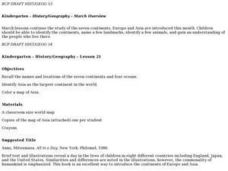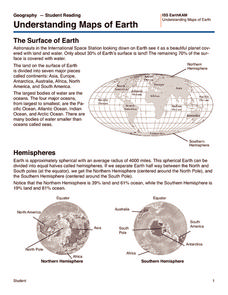Curated OER
Using the Four Main Directions in the Classroom
Learners utilize a compass to determine where North is in the classroom. In this direction lesson, students label the four main directions. Learners locate features in the classroom and describe the directions to get to them. Students...
Curated OER
Magnetism
Students investigate magnets. For this magnetism lesson, students begin exploring magnets. Students study attraction and repulsion and discover the poles of a magnet.
Curated OER
Give Me Some Latitude
In this latitude worksheet, students use an atlas or other reference to respond to 4 multiple choice questions about the equator and the poles.
Curated OER
History/Geography
Students review North America, Africa, Europe and Asia. They identify Australia as the smallest continent. They identify Australia as an island continent nicknamed "the land down under." They color a map of Australia.
Curated OER
Strange Attractor
Learners explore magnetism. In this magnet activity, students assemble a magnet pendulum. Learners observe the pendulum noting the location of the magnetic poles as they construct the pendulum so that the free-swinging magnet comes as...
Curated OER
Magnetism
In this physics worksheet, students complete each of the statements with the correct word or phrase. Then they match each of the words listed on the left with their correct descriptions on the right.
Curated OER
Magnets
In this magnets instructional activity, students review magnetic properties and define an electromagnet. This instructional activity has 10 fill in the blank, 1 drawing, and 3 short answer questions.
Curated OER
Magnets
In this magnets worksheet, students draw pictures of different magnets that are described on each page. Students complete 9 pictures.
Curated OER
Movement of Air II
In this movement of air learning exercise, learners determine the deflection of air masses that result from Earth's eastward rotation. Then they describe what winds provide for different trades. Students also identify and describe the...
Curated OER
Polar Biomes
Second graders research the animals, climate, and plant life in both of the Polar regions. They explore a variety of websites and complete a WebQuest. Students complete a chart, view a PowerPoint presentation, and answer true/false...
Curated OER
Latitude on World Maps
Sixth graders examine the purposes of maps. In this Geography lesson, 6th graders practice using latitude and longitude on a map.
Curated OER
Magnetism: Magnet, Magnet, Where are you?
Students study the characteristics of magnets including polarity, and the concepts of attraction and repulsion. They examine how magnets are used industry.
Curated OER
The Celestial Sphere
Students are introduced to the celestial sphere, describing its apparent rotation and the special role of the pole star.
Curated OER
NASA Plans Moon Base
Students react to statements about the moon, then read a news article about NASA's plans to build a permanent base on the moon. In this space science and current events lesson, the teacher introduces the article with a discussion and a...
National Wildlife Federation
Why All The Wiggling on the Way Up?
Some of the CO2 emitted by burning fossil fuels is removed from the atmosphere by natural sinks, such as the ocean. The fifth engaging lesson in the series of 21 examines the CO2 data from three very different locations. It then makes a...
Curated OER
Magnetism
In this physics instructional activity, learners fill in 14 blanks involving the Domain Theory of Magnetism. Students interact with a variety of aspects dealing with magnets.
International Technology Education Association
Tidy Up Those Sloppy Force Fields!
It is just magnetic. This resource presents the concept of Earth's and another planet's magnetic field and how spacecrafts detect them. Learners study a problem using magnetometers and participate in three experiments to come up with a...
Institute for Geophysics
Understanding Maps of Earth
Here is your go-to student resource on primary geography concepts, including facts about the surface of the earth and its hemispheres, latitude and longitude, globes, types of maps, and identifying continents and oceans.
Curated OER
Attract or Repel?
Opposites attract with a fun science experiment on magnets. With a short paragraph on background knowledge, the lab sheet prompts third and fourth graders to choose which pairs of magnets will attract, and which pairs will repel. A...
Curated OER
What Causes Day and Night?
Why do we have four seasons? A series of questions about the Earth's orbit and its impact on seasons challenge Earth science students.The second page of the resource has nine multiple choice questions, such as "One year on Earth is one...
Curated OER
Magnificent Magnets
Students identify the properties of a magnet. In this physics lesson plan, students explore the strength of the magnet by testing out how a magnet reacts to various materials. The various objects the students test include paper clips,...
K12 Reader
World Climates
Why is weather different around the world? Learn about world climates with a reading comprehension passage. Kids read a short passage before answering five comprehension questions based on context clues.
Curated OER
Geography Terms
Introduce the terms and concepts related to basic map and geography skills. Terms include full definitions and cover latitude, longitude, the Equator, Tropic of Cancer, Tropic of Capricorn, Prime Meridian, and the International Date Line.
California Academy of Science
Tropical Belt
Where in the world is the equator? Explore a world map with your class, coloring in oceans, continents, and rainforests while locating the three major lines of latitude: the equator, Tropic of Cancer, and Tropic of Capricorn. Discuss how...

























